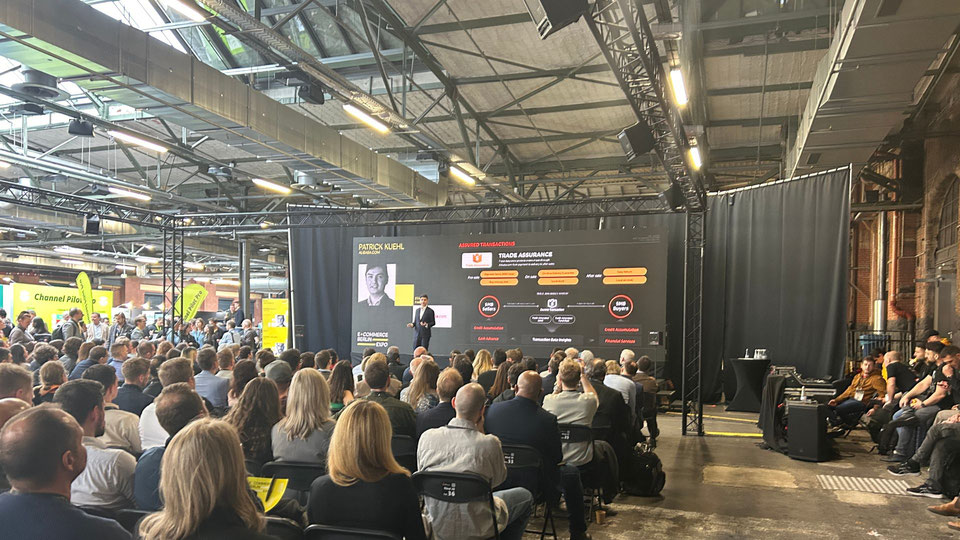What is this article about?
This article sheds light on the latest E-commerce Berlin event in Germany, dedicated to various industries. We provide insight into business presentations conducted by market leaders and highlight the significance of a robust long-term marketing strategy intertwined with your distribution network. These aspects are crucial for marketing in e-commerce. Join us as we explore effective promotion strategies and optimize your overall marketing strategy for sustainable success.
Table of Content
E-commerce Berlin 2024 marketing conference and not only
E-commerce highlights the importance of a long-term marketing strategy and its close ties to a company's distribution network. It emphasizes the need for businesses to align their marketing strategies with long-term goals for promotion within this framework. In doing so, it underscores the critical role of a well-integrated marketing strategy and the pathway to achieving sustained success in today's competitive landscape.
On February 22, 2024, we had an excellent opportunity to participate in the Berlin e-commerce conference dedicated to the e-commerce market. The event was planned to be visited by 11K people. We could observe representatives from several sectors, including media, e-shops, retailers, manufacturers, service providers, brands, and logistics and fulfillment service providers. Among the many companies, we could meet experts such as Amazon Freight, FedEx, Ikea, Deutsche Post DHL, Alibaba.com and many others supporting the e-commerce market and fulfillment.
The top exhibitors focused on fashion, home & garden, gifts & collectibles, and other sectors. However, there was also significant interest in electronics & media, automotive & industrial, solutions for last-mile delivery, and IT solutions, where Artificial Intelligence (AI) emerged as a leading topic for today's e-commerce market.

E-commerce event in Berlin: Meet the keynotes
As mentioned previously, AI has made an extremely significant impact on the market, and e-commerce stands to benefit from this in a wide range of ways. Among the various e-commerce solutions, Vision.ai stands out, providing more selective search results for online shopping without collecting personal data from users' browsers. By leveraging machine learning, the AI provided by Vision.ai delivers more accurate results on online stores. The company's partnership manager, Johannes Reher, briefly shared its cutting-edge technology.
Considering that 38% of all search results come from e-commerce platforms, and marketplaces we can assert that such solutions are precious for users, customers, and business owners. AI will also undoubtedly lower inventory and shipping costs in the future (if not alraedy!).

Dr. Anamika Datta from Zalando.com gave one of the leading keynote presentations about AI. In her speech, we learned more about the value of AI solutions and how they enable e-commerce capabilities in the market. Dr. Anamika promoted her contribution to the AI community with AIQ ©, which formulates a calculation for companies to understand their AI score. Her speech gives more background on the future of artificial intelligence in e-commerce, technology (AR / VR), Web3.0, iOT, Zero Trust Architecture and Digital Twings.
Another keynote speaker from the Berlin event was Moritz Bernhard, Head of Uber Direct, who presented innovative developments in fast delivery for the e-commerce market. Uber Direct is one of the innovations that enable e-commerce stores to handle deliveries locally using the Uber drivers network. This brilliant idea is akin to the well-known service Uber Eats, which allows for fast delivery of meals to consumers. So, your future online store can work locally with Uber Direct and provide your customers with fast delivery to your local area within an hour. Amazing, insn't?

There would only be effective e-commerce with efficient logistics and transportation. This is where FedEx comes into play. During the presentation, Chris Hodge, the e-commerce market manager at FedEx, explained simple rules to streamline shipping. He linked his presentation to document management while shipping abroad, explaining what causes most delays in international trading. Surprisingly, according to FedEx, 55% of e-commerce companies perceive cross-border e-commerce as complex and difficult, with one of the reasons being problems with documentation.
Therefore, proper document management is essential and can only be done better with a sound document management system (DMS). Companies should consider implementing a DMS for international shipping to help them stay up-to-date with customs regulations and make customs clearance easier. One of the leading companies in developing such document management solutions is Adexin from the US.
E-commerce companies have solidified their position in the market through long-term collaborations with subcontractors and customers. The longevity of a company in the market brings about various benefits. With sufficient time in the market, a company establishes the reliability and the quality of its services or goods to its customers. This is exemplified by companies like Allegro from Poland, a top leader in e-commerce, which can even outperform Amazon in this market. Allegro was also present at the E-commerce Berlin event.
Get on the run with long-term marketing strategies
A strong business position in the e-commerce market relies on various areas and strategies closely linked to long-term planning and actions. This strategic focus ensures that marketing efforts are most effective when viewed from a long-term perspective.
Long-term marketing operations are always linked to other resources in the company and have a close relationship with different areas. For instance, marketing operations have strong ties with these areas in e-commerce:
Distribution network and fulfillment: Transportation and warehousing require various approaches to design supply chain solutions accurately. Distribution operations may involve long-term contracts for warehousing and carriers responsible for delivering goods. Understanding the sales areas where goods are delivered to end customers and intermediaries is crucial for marketing activities, which should be driven by distribution solutions.
Subcontractors: E-commerce businesses rely on subcontractor reliability and must provide goods or services based on contractual arrangements. Business contracts can vary in duration, and companies must deliver what they have agreed to. Marketing should consider all added values for customers in B2B relationships and product/service limitations.
Financials: E-commerce operations entail significant financial implications to cover delivery and payment costs. Operations are highly saturated, with business dependencies on financial institutions such as bank loans, which can be risky if neglected. Charges or losses resulting from contractual agreements, such as returns and damages, are also significant. The role of marketing is to increase business visibility and sales, and investment in marketing should be viewed not as an expense but as the revenue it can generate.
Digital marketing: E-commerce relies heavily on digital marketing, where content and SEO are crucial. We learned about SEO for e-commerce from Julia Nesterets, CEO of JetOctopus.com, who shared during one of the presentations at the E-commerce Berlin event. Focusing on digital marketing is crucial for visibility, especially given that most traffic now comes from mobile devices, so it all happens online and never falls apart from SEO.

The aforementioned cross-linkages are crucial to the success of marketing activities. Marketing activities should be fully integrated with all operations inside and outside the company. Aligning operational business projections with marketing helps increase sales and prevent losses.
Well-tailored marketing activities are fully connected to the business on many levels. By understanding all business relationships, a company can create a strong customer marketing message. By considering the efficiency of production, distribution, and different business contracts (also with banks and institutions), a company can take the right direction in creating content for B2B. By learning from these aspects, a company can save money on marketing with well-chosen marketing channels and activities. This is how a company can make suitable investments in marketing and make marketing profitable with remarkable revenue.
Questions about the topic:
The distribution network is highlighted as a critical component in successful long-term marketing strategies, and the blog explains how it should be closely integrated with marketing efforts.
Major marketing strategies encompass a range of approaches aimed at achieving different objectives within the market. These strategies include market penetration, focusing on increasing sales in existing markets; product development, which involves creating or enhancing products to meet evolving customer needs; market development, targeting new markets with existing offerings; diversification, expanding into new products or markets; differentiation, emphasizing unique features to stand out from competitors; cost leadership, becoming the lowest-cost producer in the industry; and niche marketing, targeting specific segments with specialized offerings. Each strategy requires careful planning and execution to effectively reach target markets and achieve business goals.
Your go-to B2B marketing agency
Elevate your brand with Expler, a trusted content marketing agency specializing in enhancing your presence in Poland and Dutch market. Boost your visibility with compelling videos and
targeted B2B content marketing campaigns tailored to the unique needs of your business. Contact us today to elevate your brand and make a lasting impact in the Polish and Dutch
market.






Write a comment